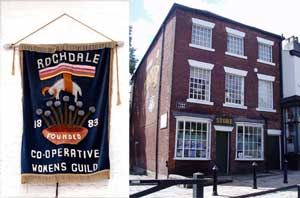Rochdale Pioneers Toad Lane Store
Founded: 1844
Number of members: 28 founding members
Equity investment:Two weeks wages down, with 10 weeks total investment
Retail square footage: Tiny
On the longest night of the year, the founders of the consumer cooperative movement opened their grocery store in 1844 in Rochdale, England with little fanfare and five items for sale. Their store was lit with candles, not because it was a solstice celebration, but because the gas company wouldn’t supply them with gas. Throughout the evening, a cadre of young factory boys stood outside yelling taunts. It was a gloomy and long night indeed for the Rochdale Pioneers.
Yet the 28 people who formed the core of the cooperative grocery store’s ownership remained steadfast. They wanted to put a stop to the practices of the company store that left them indebted to the factories they worked for, and without an alternative to inflated prices and shoddy goods. At the outset, the Toad Lane store was open two nights a week and did not accept credit. To their way of thinking, credit was one of the evils of the system that needed to be stopped.
Although they had little means, their membership investment was intentionally steep. The co-op required two weeks wages up front to join, with a total commitment of 10 weeks wages. The Pioneers believed they needed to cover any liabilities the co-op might incur, in part because of the risk at hand, but they also expected the capital to be the building block for more cooperatives to expand the movement.
By the 1860s the co-op had expanded its departments and locations and increased their consumer activism. In a protest against the adulteration of flour, they built their own flour mill and became champions of pure food. Virtually everything—flour, coffee, sugar, butter, tea—was mixed with something—dirt, wood shavings, iron fillings, nut shells. They were also committed to promoting “honest weight” and “fair dealing” when it came to selling goods by the pound.
The Pioneers got their self-help start by selling groceries, but they believed that education was the tool that led to a better life. Educational opportunities were limited. There were no public schools or lending libraries. In order to better serve their members, they felt like people needed to be educated, to have better jobs, as well as to advance the idea of cooperation. They created a classroom above their store for night classes focused on literacy and invested in books for a library. What they ultimately created through their efforts was a university extension service for adult education in England, and a worldwide precedent for such programs.
Ultimately, the Pioneers wanted to create cooperative society that helped people have good jobs and a home, healthy food and a strong community. They continually strove to do something constructive in the world based on the values of sharing resources for the common good. Today, thanks to one little grocery store, cooperatives of all kinds exist and millions of people share in the benefit of cooperative ownership. Those small candles lit on a solstice evening long ago grew into a beacon of humanity and hope lighting the way for others to follow.
Have more questions?
Get in touch with one of our consultants.
